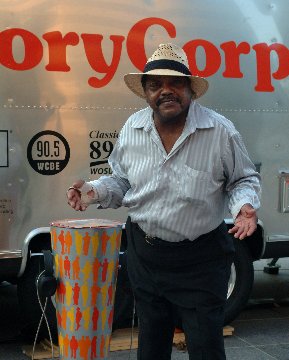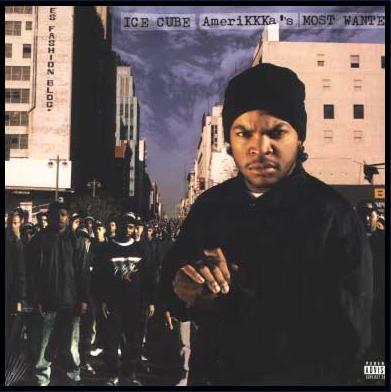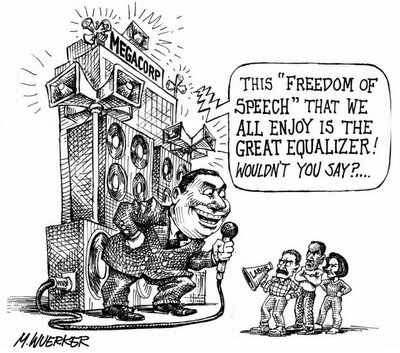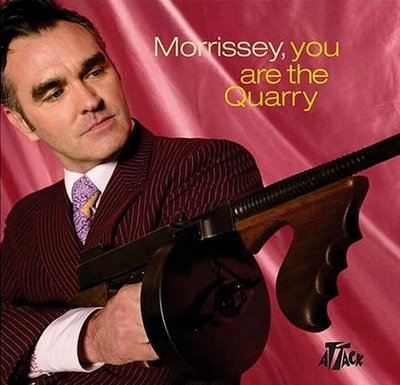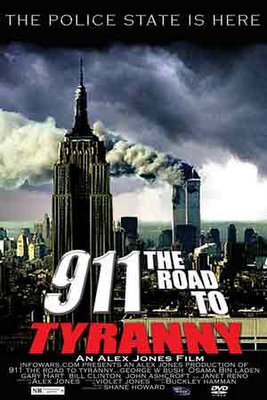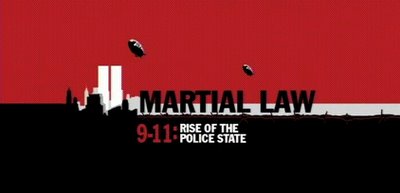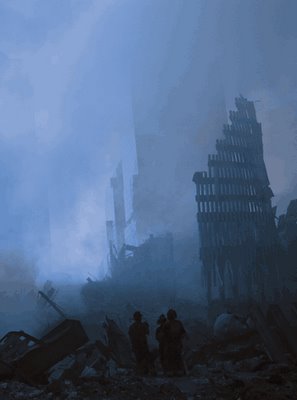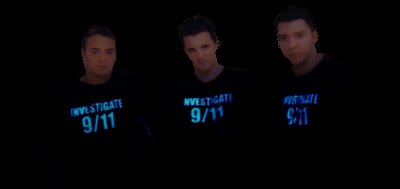
Watching one of my favorite daily news broadcasts ever, the internationally acclaimed and deservedly so, "Democracy NOW!"
If you don't watch it you should, and if everyone does we'll be fine.
It's strange to see what we see today, a world that seems to be sliding off a cliff, or perhaps slowly descending into the Ninth Circle of Hell. Perhaps the entire planet is in a giant pot of boiling water, and while us boiling frogs are feeling the heat, we still fail to react by jumping up and down until we splash our way out.
The Ninth Circle of Hell is reserved for Treachery, at least according to various myths including "Dante's Inferno", and the place where the worst punishments are found. The biggest treachery is to destroy the greatest gift, arguably the gift of Love.
Love is a funny thing, or at least it can be. It's difficult to describe, and yet much like being "in love" you think you know it when you see it. Love is in it's indescribability (it's so indescribable it needs new words) among the most fluid and personal emotions. No one can tell you what you love, and you can't tell anyone else what they love. Nor whom. Sometimes you can't even tell yourself what you love. Nor whom. Not even yourself.
Earlier in the hour-long broadcast was the nitty-gritty, the dirt on the demons plaguing the planet. There were the headlines of the usual domestic fascism, subtle in it's generic description though obvious in it's intent. There were the human rights abuses in Iraq courtesy of the exasperated former UN human rights chief there, an enlightened fraction of what has to be going on in that country. I hardly think the car-bomb news stories that were in-style a few months back define what's been going on either, and "22 killed" in some random marketplace cannot possibly represent the actions of 140,000 foreign troops plus private lawless armies, plus the ever-escalating bombing raids and the use of depleted uranium, which is basically a nuclear weapon without the explosion. I'm guessing a million people have been killed with millions more in the future, plus genocidal after-effects.
Next came Katrina, and oh yes, the poor who were initially the targets of the governments "failure of initiative" are still being targeted by creative new initiated failures. While the mainstream media earned it's compassionate bonafides early, that merely provided cover-fire for it's utter neglect late. Ignoring the world is one thing, and the standard rules on tragedy still apply: one American life is worth ten Europeans which is worth a thousand Africans or Asians. However, in the piece-by-piece dismantling of the United States of America and her flawed though priceless role as a symbol of striving for values the world should strive for, the domestic abuse continues sight-unseen as a test-market for expanding the police state. New Orleans is one-quarter the size it was, and to quote Minor Sinclair, the Director of regional programs for Oxfam: "Yes. I mean, it reads like the Congo. Three quarters of a million people [are] still displaced."
Finally on to love, a jarring and welcome juxtaposition.
StoryCorps, a national project traveling America and recording the stories of 5000 ordinary people so far, is a brilliant idea. As a reaction to recent responses of "What can we do?" and "Where's today's Gandhi?" by a Joe Smart-Guy I met, I was planning on writing "The Search for Heroes in the 21st Century..." and this is as inspirational a bit of intellectual snack-food as any. In quick response to Joe's questions, first, the media doesn't discuss heroes anymore on purpose despite the literally millions of opportunities, for they would expose solutions to problems that are deliberately underreported; second, Gandhi was a creation of people reacting to his ideas in a unique situation, and much like Hitler is the model for fascism that'll keep us from recognizing the current one, Gandhi can't be mislabeled as the last great one-off success story when his work and the work of like-minded peers needs to be done in their own respective ways.
The StoryCorps story cited by Democracy NOW! was a timeless and yet timely (obviously!) tale of love, as told by a couple in Grand Central Station in New York. Love has been cited as "the answer" for so many years in so many ways that it's cliche today. But, there's a reason cliche's are valuable: the say what they mean, and they mean what they say.
And, there's a reason love is valuable: do you know it?
I could wax poetic about what this short story meant to me, but clearly you can see it meant something. Rather than write about how or why it struck a specific chord, I'd rather let it strum a tune on your heartstrings in it's own way, in it's own time, and maybe, just maybe, it'll work.
WATCH - http://www.democracynow.org/article.pl?sid=06/02/28/1427252
Love,
BK
____________________
...
Black Krishna Brand
Philosophy - http://blackkrishna.blogspot.com/
Music - http://www.soundclick.com/bands/0/blackkrishna.htm
...
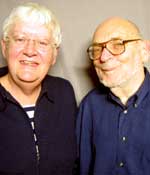
Tuesday, February 28th, 2006
National Oral History Project StoryCorps Travels America, Recording Stories of Ordinary PeopleListen to Segment || Download Show mp3
Watch 128k stream Watch 256k stream
Help Printer-friendly version Email to a friend Purchase Video/CD
We speak with award-winning radio producer Dave Isay, the creator of StoryCorps, the audio-recording project which has just begun a six-month, 10-city national tour, and has completed about 5,000 interviews. We begin with a look at the story of Danny and Annie Perasa, the couple the StoryCorps booth in Grand Central Terminal was dedicated to earlier this month. [includes rush transcript] A funeral is being held today in Brooklyn for longtime New York resident Danny Perasa. He died in his sleep on February 24th after being diagnosed last month with terminal pancreatic cancer. While many Americans may not have heard of Danny, his story remains preserved forever -- in sound.
Two years ago, Danny and his wife, Annie, entered a StoryCorps recording booth in New York City’s Grand Central Terminal to record the remarkable story of their first date. They have returned numerous times since, to document events in their lives.
StoryCorps is a national project to instruct and inspire ordinary people to record each other’s stories in sound. The project, which has just begun a six-month, 10-city national tour, has completed about 5,000 interviews. It has the potential to become one of the largest documentary oral history projects ever donated to the Library of Congress.
* Dave Isay, award-winning radio producer and creator of StoryCorps.
RUSH TRANSCRIPT
This transcript is available free of charge. However, donations help us provide closed captioning for the deaf and hard of hearing on our TV broadcast. Thank you for your generous contribution.
Donate - $25, $50, $100, more...
AMY GOODMAN: Award winning radio producer Dave Isay who joined us in our firehouse studio yesterday.
DAVE ISAY: Story corps is a project that started about 2 1/2 years ago in Grand Central Terminal. It is a very simple idea. We built a booth in grand central. And you bring anyone you want to the booth. Your grandmother, a friend, the person who brings you eggs in the morning at the diner every day. Anyone who you want to get to know. You are met a at the time booth by someone called a facilitator. Someone who works with us. For a few minutes the facilitator talks to you about how to do an oral history and then brings you inside the booth and closes the door. We have designed it as a sacred space. It is very dark and perfectly quiet in the middle of grand central terminal.
You sit across from your grandmother. The facilitator is in the corner. For 40 minutes you talk about anything you want to talk about. But most people talk about the kind of big kind of life questions. How do you want to be remembered? What are the most important moments of your life? What did you sing to me when I was a kid? At the end of 40 minutes, two CD's have been burned. One goes home with you and another one goes to the American Folk Life Center at the Library of Congress one part of an oral history of America.
AMY GOODMAN: How did you come up with this idea?
DAVE ISAY: Well, I have been doing radio for about 20 years now. And the person sitting across from me gave me my start. All those many years ago.
AMY GOODMAN: I remember it well. The day you walked in and said we need to do a piece on a drug paraphernalia museum on the Lower East Side. You came to WBAI and I said, “Why don't you do it, sir?”
DAVE ISAY: That was it.
AMY GOODMAN: And young you--
DAVE ISAY: Yes.
AMY GOODMAN: Went out with a tape recorder.
DAVE ISAY: But I have been doing-- and you taught me so much in those early years. And I have been doing radio documentaries for a long time now. I did a documentary about 13, 14 years ago with two kids growing up in a housing project in Chicago called the Ida B. Wells Projects where I gave them tape recorders and had them do a diary of their lives. I saw that when these kids took these tape recorders and interviewed say, their grand parents, that having a microphone and laying in bed with their grandmother and asking her these questions, allowed these kids to ask questions they wouldn't normally get to ask. And created bonds that existed long after the tape recorder got turned off. And then when these relatives passed away, these tapes became enormously important to these young men. So that was really the beginning of Story Corps.
And over the years there were a bunch of other project that just made me kind of think that all of the whole country should have access to a project like this and should be able to have these kinds of conversations. You love radio. I love radio. There's such an intimacy in the voice and just being in a quiet place and getting to ask people questions, you don't normally get to ask, and you know, the idea of Story Corps is that all of our stories matter and everybody should be treated with dignity. Everyone's story should be preserved in a thoughtful and dignified manner. That's what the project is about.
AMY GOODMAN: Let's go to the audiotape. The first example of voices from Story Corp.
DAVE ISAY: Sure. The first clip we have is a clip that was recorded very early at our Grand Central Booth. And this couple-- his name is Danny Perasa, he was an O.T.B. Clerk in New York City and his wife's name is Annie. And they came to the booth just about -- at the beginning of 2004. And they wanted to tell the story of their very first date. So this is Danny and Annie Perasa.
DANNY PERASA: She started to talk. And I said, listen, I'm going to deliver a speech. At the end you are going to want to go home. I said, you represented a dirty 4-letter word and that word is love. If we are going anywhere we are going down to the aisle because I'm too tired, too sick and too sore to do any other damned thing. She turned around and she said of course I'll marry you. The next morning I called her as early as I possibly could.
ANNIE PERASA: And he always gets up early.
DANNY PERASA: To make sure she hadn't changed her mind. And she hadn't. Every year on April 22, around 3 o’clock, I call her and ask her if it was today would she do it again. So far the answer has been the same.
ANNIE PERASA: 25 times yes.
DANNY PERASA: You see, the thing of it is, I always feel guilty when I say “I love you” to you and I say it so often. I say it to remind you that, as dumpy as I am, it’s coming from here. It’s like a beautiful song from a busted old radio. It is nice of you to keep the radio around the house.
ANNIE PERASA: If I don't have a note on the kitchen table I think there's something wrong. You write a love letter to me every morning.
DANNY PERASA: The only thing that could possibly be wrong is I couldn't find a silly pen.
ANNIE PERASA: “To my princess, the weather out today is extremely rainy. I'll call you at 11:20 in the morning.”
DANNY PERASA: It is a romantic weather report.
ANNIE PERASA: “And I love you. I love you. I love you.”
DANNY PERASA: When a guy is happily married, no matter what happens at work, no matter what happens in the rest of the day, there is a shelter when you get home there is a knowledge knowing you can hug somebody without them saying get your hands off me. Being married is like having a colored television set. You never want to go back to black and white.
AMY GOODMAN: So that was Danny and Annie Perasa, the beginning of 2004?
DAVE ISAY: Yeah. And you know, I think Danny and Annie represent -- say a lot about what this project is about to me is the idea that our story is the stories of every day people are just as interesting and important as the stories of Martha Stewart and Donald Trump and all this nonsense we are fed from every place all the time. Danny actually, Danny and Annie over time became kind of the matriarch and patriarch of the project. Danny came back to the booth many, many times. He came back with Annie to talk about their love and brought all kinds of characters from his life into the booth. They interviewed them. A major league umpire and an undercover cop. All sorts of people. And they fell in love with Story Corp and we fell in love with them.
Eventually we started traveling the country with them talking about story corps. And sadly in January, Danny was diagnosed with fast booth to Danny and Annie. Then on February 17, Danny, whose cancer was spreading very, very quickly, asked us to come to his house to record one final interview with him and Annie. So I brought that with me. This is Danny and Annie Perosa on February 17 in their house in Bay Ridge, Brooklyn.
ANNIE PERASA: The illness is not hard on me. It is just, you know, the finality of it. And him, he goes along like a trooper.
DANNY PERASA: Listen, even downhill a car does not roll unless it is pushed. You are giving me a great push. The deal of it is we try to give each other hope and not hope that I will live, hope you will do well after I pass. Hope the people will support her. Hope that you can meet somebody and if she likes him, she marries him.
ANNIE PERASA: Yeah, he has everything planned.
DANNY PERASA: I'm working on her. She said that it was her call, she wants to walk out behind the casket alone. I guess that's the way to do it because when we were married, you know how your brother takes you down, your father takes you down. She said well, I don't know which of my brothers will walk me in. I don't want to offend anybody. I said, I got a solution. I said, you walk in with me. You walk out with me. And the other day, I said who is going to walk down the aisle with you behind the casket to support her? She said, nobody. I walked in with you alone. I’m walking out with you alone.
There is a thing in life where you have to come to terms with-- dying. I am coming to terms with dying. I want to come to terms with being sure that you understand that my love for you up to this point was as much it could be and as much as it could be for eternity. I always said the only thing I have to give you is a poor gift and it is myself. And I always gave it. And if there is a way to come back and give it, I will do that, too. Do you have the Valentine's Day letter?
ANNIE PERASA: Yes. “My dearest wife. This is a very special day. It is a day of which we share our love which still grows after all these years. Now that love is being used by us to sustain us through these hard times. All my love, all my days, and more. Happy Valentine's Day.”
DANNY PERASA: I could write on and on about her. She lights up the room in the morning when she tells me to put both hands on my trousers so that she’ll support me. She lights up my life when she says to me at night wouldn't you like a little ice cream? Or would you please drink more water? I mean, those aren’t very romantic things to say but they stir my heart. In my mind and my heart, there has never been, there is not now, and never will be another Annie.
AMY GOODMAN: Danny and Annie Perasa.
DAVE ISAY: Danny passed away one week after he made this recording. And you know, I think that, as I said before, they really personify so much of what Story Corps is about. Our motto is: Listening is An Act of Love. And you can -- you can hear in every word in that interview, the love between Danny and Annie. And you know, that's what the story -- that's what Story Corps is about. You know, other people who are watching on the TV show can see pictures of Danny. He was -- you know, he was a short gnome of a guy, missing a lot of teeth, bald. And when you walk down the street you wouldn't necessarily notice the guy.
But Story Corps is about taking the time to really listen to the people you wouldn’t necessarily notice walking down the street. When you do listen, you see the poetry and grace that, you know, is in all of us. I think Story Corps is about recognizing how much we all share in common. We spend so much time in this country, kind of shouting at each other. And story corps is an opportunity to listen to each other and recognize that there's so much more we share in common than divides us.
Hopefully, this is a project which will help us become a more compassionate and thoughtful nation which is something we need.
AMY GOODMAN: Award winning radio producer, David Isay. He is the founder of Story Corps. Danny Parasa is being buried today. His funeral is at the Visitation Monastery, a nunnery in Bay Ridge, Brooklyn, where his wife, Annie, is a volunteer nurse.
To purchase an audio or video copy of this entire program, click here for our new online ordering or call 1 (888) 999-3877.
SOURCE - http://www.democracynow.org/article.pl?sid=06/02/28/1427252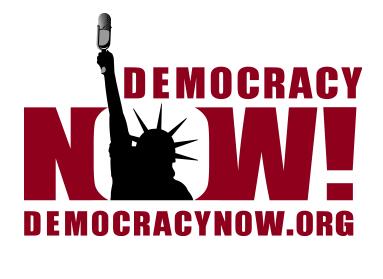 STORYCORPS - http://storycorps.net/
STORYCORPS - http://storycorps.net/